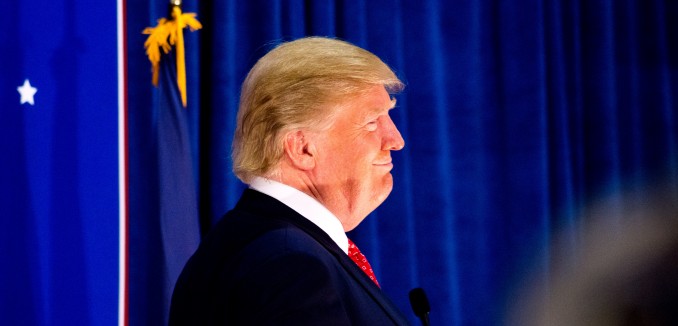…Now What?
Donald Trump’s surprise election as President of the United States has led to a new focus on the foreign policy challenges he will face, especially in the Middle East. Among those challenges: wars in Syria, Iraq, and Yemen; a Kurdish push for independence; a regional power struggle between Iran and Saudi Arabia; Iranian non-compliance with the nuclear deal that it signed last year; and the unresolved Israeli-Palestinian conflict.
Israeli Prime Minister Benjamin Netanyahu called both candidates following the vote. Netanyahu called President-elect Trump “a great friend of Israel,” and expressed his gratitude for Trump’s longstanding support of the Jewish state. The two discussed a number of regional issues, and Trump invited Netanyahu to visit Washington “at the first opportunity.” Netanyahu also thanked former Secretary of State Hillary Clinton for her support for Israel over the years and offered her an open invitation to visit.
A week before the election, Iranian Supreme Leader Ayatollah Ali Khamenei weighed in on Twitter, criticizing both candidates and saying that the “US system is far away from values of humanity.” Khamenei, who has yet to make remarks about the U.S. since Trump’s victory, wasn’t able to affect the outcome of the American election, but if he doesn’t like the results of next year’s elections in Iran, he can just ignore the vote and pick the winner like he did in 2009.
Are Anti-Israel Campus Campaigns Connected to Terror?
Two researchers at the the Foundation for Defense of Democracies wrote last week that the anti-Israel boycott, divestment, and sanctions (BDS) campaign against Israel has significant ties to the Popular Front for the Liberation of Palestine, which is recognized as a terror group by the United States, European Union, Canada, and Australia.
The Tower featured coverage of multiple BDS events on college campuses, including a symposium at Columbia University Law School and a conference at George Mason University hosted by Students for Justice in Palestine—an organization that, as former Tower Tomorrow Fellow Jessie Nejberger observed, “promotes war, hate, and destruction, with numerous SJP leaders, members, and guest speakers going so far as to endorse terrorism.” (For an overview of SJP’s history of intimidation towards Jewish students and support for terror, read Daniel Mael’s On Many Campuses, Hate is Spelled SJP.)
But two blows were recently struck against BDS. First, Pennsylvania Gov. Tom Wolf (D) signed a bipartisan bill prohibiting the state from doing business with individuals or companies that discriminate by singling out Israel for boycott. And a few days later, the Office of the Independent Adjudicator (OIA), a regulatory body governing British universities, censured Sheffield Hallam University for failing to respond to a student’s complaints of intimidation by anti-Israel activists, and urged the university to pay the student £3,000 (about $4,000) for failing to address the student’s original complaint.
Scorched-Earth Palestinian Politics
Undeterred by recent discoveries cementing proof of the historic Jewish connection to Israel, the Palestinian Authority is said to be considering using UNESCO, the United Nation’s cultural organization, to make an official claim of ownership of the Dead Sea Scrolls, the ancient Jewish texts discovered in a cave in the West Bank in the 1940s and 50s.
UNESCO has already shown itself to willing to ignore history, twice approving resolutions last month that denied the Jewish historical connection to the Temple Mount in Jerusalem. Unfortunately for the PA, this may have meant that they were questioning Muslim history too—a newly-discovered inscription on a centuries-old mosque near Hebron refers to the Jewish Temples that stood on the Temple Mount.
When not denying history, the PA sometimes makes it up. The PA’s official television station has been repeatedly broadcasting a video this week that promotes the discredited conspiracy theory that Israel poisoned then-Palestinian Authority President Yasser Arafat in 2004. A 2013 forensic examination showed that Arafat died of natural causes.
The internationalization of the PA’s claims against Israel, as demonstrated through the Authority’s efforts at UNESCO and other global bodies, nearly extended to Interpol. But at its annual meeting this week, the global police agency refused to hold a vote admitting the PA as a member. Israeli leaders were concerned that the PA may share Interpol’s classified information with suspected terrorists.
Feature: What the Next President Must Do About the World
Veteran foreign correspondent Michael J.Totten looks at the challenges that Donald Trump will face upon being inaugurated in January. Totten advises the 45th Commander-in-Chief not to be too ambitious: “You will not be able to democratize the Middle East and drain the swamp of its political pathologies by using regime change or any other tool at your disposal.” Rather, Trump must be resigned to the fact that the issues emanating from the region are “problems to be managed rather than solved.” Drawing on his experience and reporting around the world, Totten then provided potential American policies towards a series of foreign policy challenges, including with Russia, Iran, the Kurds, Turkey, Israel, and the Palestinian Authority.
This Week’s Top Posts
• Wish You Weren’t Here: Citibank Joins AmEx in Cutting Ties to Roger Waters
• The Pro-Palestinian Left is Tearing Itself Apart Over Syria
• UK Universities Regulator Strikes Blow Against Campus Anti-Semitism
Three Big Questions
The election of a new president is a time of transition. In recent months, Iran has ramped up its aggressive behavior around the globe. Will Iran see the lame duck period of the Obama administration as an opportunity to dial up its mischief even more?
Reuters reported this week that Iran has violated the nuclear deal’s limits on heavy water, a necessary element to create a plutonium-based nuclear weapon, for the second time since the United States lifted nuclear-related sanctions. What new violations of the deal can we expect to see?
Netanyahu has scheduled upcoming trips to Azerbaijan, Kazakhstan, Singapore and Australia—the last three of which have never before been visited by a sitting Israeli prime minister. What new diplomatic moves can we expect to see from Jerusalem?
[Photo: Marc Nozell / Wikimedia ]




